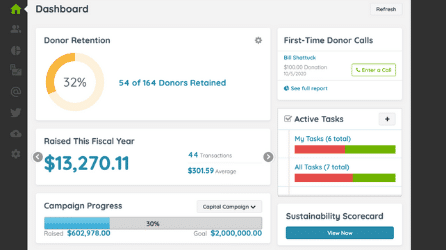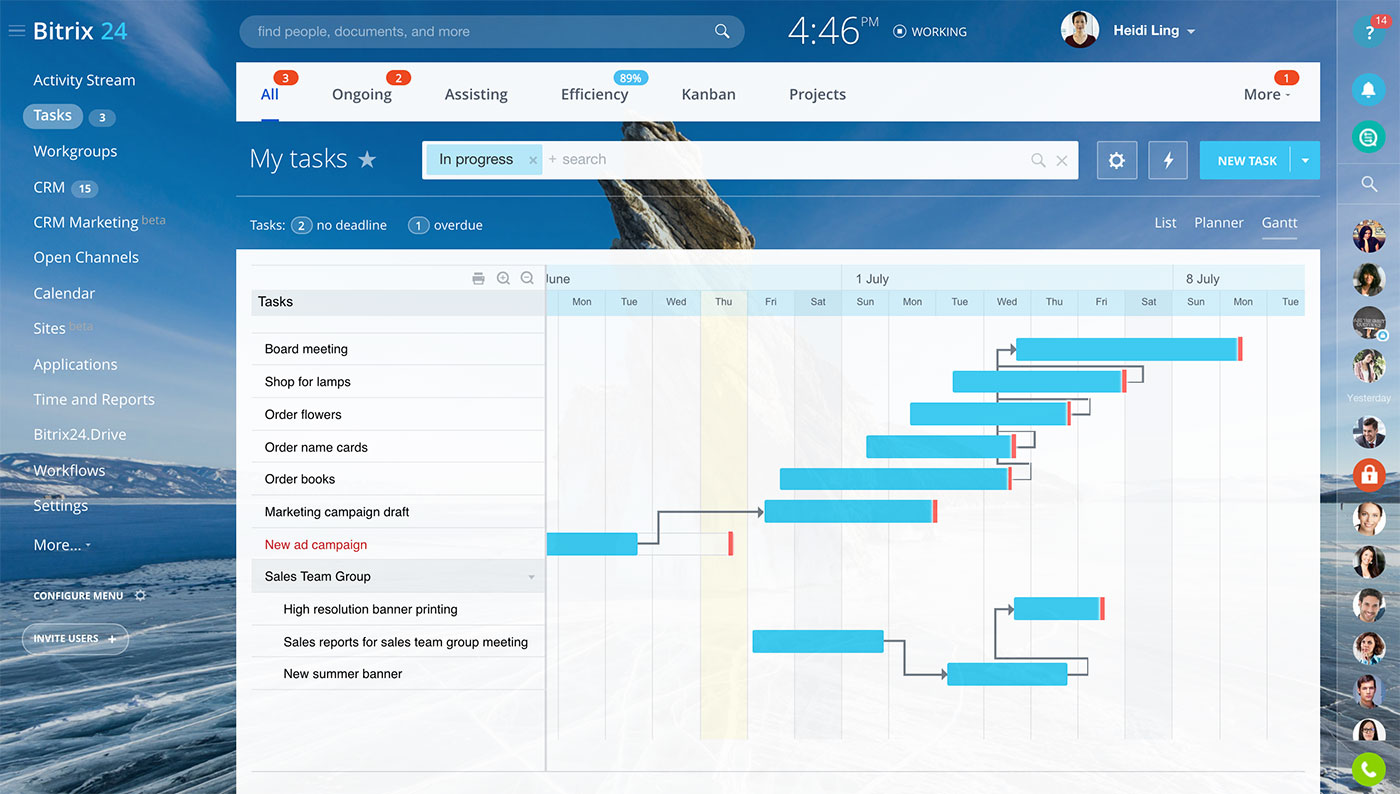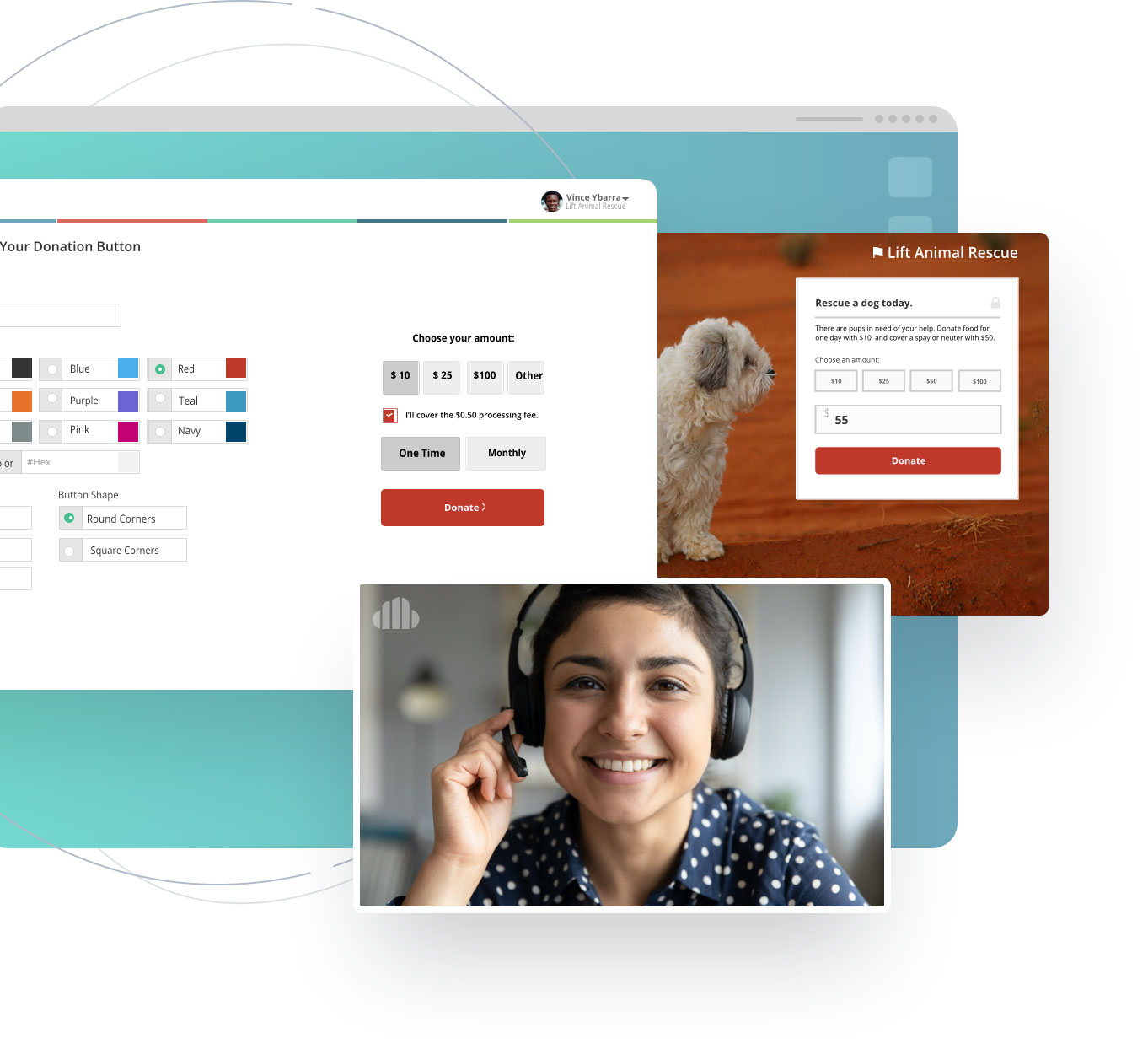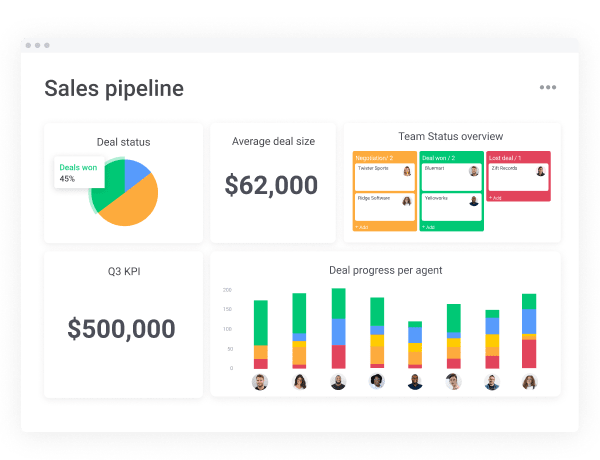Nonprofit CRM System Guide & Best Nonprofit CRM List
Build long-lasting donor relationships and maximize giving with nonprofit CRM software.
A guide to the best nonprofit CRM
最後更新: November 30, 2023
Whether you’re running a charitable organization, social welfare organization, social advocacy group, or other nonprofit business, you need a way of keeping your constituents engaged and excited. Every nonprofit needs a method of managing their contacts. That’s where CRM—or customer relationship management—can make a huge difference in your operations.
In this comprehensive guide, we’ll answer some of the following basic questions about nonprofit CRM software. And we’ll review ten of the best CRM for nonprofits options.
- What is a nonprofit CRM?
- How can using CRM tools benefit a nonprofit?
- What are the features of a nonprofit CRM solution?
- What are the best nonprofit CRM tools?
- How to choose the best platform for your organization
- FAQs
- Try contact management for free
What is a nonprofit CRM?
A nonprofit CRM is a digital tool for organizations looking to establish strong and lasting relationships with their donors. For-profit businesses use CRM as a contact manager and sales tracker to boost profits, but nonprofits can easily use the same features for tracking donations and maximizing their time and budget.
By using a customer relationship management system to manage their contacts and donor interactions, nonprofits are able to better allocate their hours and labor. That leaves more energy and resources to serve their mission.
Why should your nonprofit use CRM software?
Nonprofit organizations typically handle a lot of data, including important information about their donors and sponsors. And just as customers are the lifeblood of any business, donors and sponsors are the lifeblood of nonprofit organizations.
The more donors you have, the better. But the more contacts you have, the harder it becomes to keep them organized. When it’s time to launch a new fundraising initiative or announce an upcoming event, you need an efficient way of reaching out to your contacts in order to maximize responses.
You can certainly use spreadsheets to keep your contacts organized, but spreadsheets can only do so much. They also require constant upkeep in order to stay up-to-date, which consumes enormous amounts of hours and manpower. CRM software replaces spreadsheets and offers time-slashing tools, so you can maintain a larger contact database and easily reach out to supporters.
How can using CRM tools benefit a nonprofit?
Like most services, CRM tools come with a price. But as the benefits of using CRM for your nonprofit organization make clear, it’s worth it. If your board has questions concerning the cost, here are some of the benefits you can discuss with them to help ease their doubts.
CRM’s organizational tools are more efficient than spreadsheets
CRM software gives you tools for centralizing all of your data, which improves efficiency across the board. With a centralized and single source of truth, your team members can share and access accurate and up-to-date information in real time. From this centralized database, you can filter your contacts according to different criteria, including location, donation amounts, history, events attended, and more.
This makes retrieving donor contact information and donation history much easier than digging through multiple spreadsheets and notes. Information that can quickly become outdated if your team members are too overwhelmed with other tasks to input new contact information and records.
Using CRM improves donor retention
The cost and effort of finding new donors and nurturing them through your fundraising journey is high. Higher than convincing an established donor to give again. For that reason, donor retention is vitally important to the health of your organization.
CRM systems are built to collect and store valuable data about your donors. All so you can reach out to them in a way that best fits their preferences, schedules, and interests. This helps build and maintain loyalty and satisfaction, making your donors feel valued for their contributions.
The organizational tools free up valuable hours
The administrative tasks associated with running a nonprofit organization eat up a lot of hours. CRM platforms typically offer automation features that can handle those administrative tasks, freeing up your team members so they can apply their efforts elsewhere. From sending thank you emails to donors, to dialing potential supporters, to generating donation receipts, CRM software lets you better allocate your resources. You can get more done with your precious hours.
Reporting features provide better insight
Knowing the health of your organization and the efficacy of your efforts is key to serving your mission going forward. CRM software lets you create and share CRM reports quickly. You always have an accurate view of which campaigns are working best and which ones aren’t drawing in as much interest as you expected.
With this kind of fast and accurate reporting, your team can continue to fine-tune their efforts using actionable CRM data. They can be more confident that their work will have more productive outcomes in the future.
The key point to remember is that using a nonprofit CRM system is good for both your team and your donors. Supporters of nonprofits like to know that their donations and attention are having a positive effect. With real-time information at your fingertips, and fast methods of dispersing information to large contact lists, you can keep your contacts updated with news of how close you are to achieving goals and milestones. That reinforces their trust in your efforts.
What are the features of a nonprofit CRM solution?
- Contact management: Contact management software lets you store, analyze, and access contact details for all of the people engaged in your nonprofit. From donors, to volunteers, to high-profile sponsors, contact management lets you keep accurate records on how to reach everyone from a single platform, so you never have to worry about working with outdated information.
- Email campaigns/marketing: Send out email campaigns to your current and potential donors, then view the success of your campaigns by checking click and open rates. Also, instead of manually entering personal details into emails, this feature automatically plugs in information specific to the recipient. In this way, you can still provide a personalized touch to your messaging without having your team spend countless hours manually filling in names and information into your mass emails.
- Segmentation: Your contacts aren’t all engaged in your organization in the same way. Instead of keeping different spreadsheets to keep your contact list separated, segmentation allows you to tag contacts with specific characteristics. Like geographic location, donation amounts, and more, so you can easily view and engage with different lists depending on what messaging you want to send.
- Power dialer: An automatic dialer is a fantastic tool for reaching large numbers of contacts with ease. Whenever you need to get the word out quickly about a new campaign, event, or fundraising opportunity, your team members can use auto-dialing to reach contacts with one-click or predictive dialing. That eliminates dead-air time between calls so they can reach more people in less time.
- Reporting & analytics: Create reports in real-time so you can instantly see how well your organization is performing. From gauging the success of a live event to measuring interest generated by a new email campaign, this feature gives you accurate insight into how well your efforts are paying off. And where you may be falling short.
- Automations: Set time-specific actions so the software can work for you, freeing up your team members’ valuable hours. In traditional CRM settings, sales force automation features help free up sales reps’ schedules so they can focus on hitting quotas. In nonprofit organizations, the same automation features are used to handle repetitive and tedious administrative tasks. So you can dedicate more manpower to the efforts that require human attention.
- Task management: Set tasks for yourself or to another team member, so no time is wasted wondering what needs to be done. Store information in an activity timeline, so everyone knows what’s been accomplished and what’s still left to do.
- Calendar/reminder system: Keep everyone on the same page by setting dates and reminders. Clear everyone’s mental space by cutting down on the number of items they have to write down and remember, so you can be confident that you won’t be left short handed because someone forgot a task or event.
- Integrations: Connect your CRM with the other software platforms you’re already using, so you don’t have to waste time juggling browsers or changing formatting.
- Mobile access: Take your nonprofit work out of the office so you can connect with donors anywhere you go. Even when working off the grid, you can access and update donor information. Nothing gets lost and no one has to re-enter data when they get back to their desktop.
What are the best nonprofit CRM tools?
Zendesk

Zendesk is an all-in-one customer management and sales CRM tool for boosting productivity and maximizing valuable hours. With a broad offering of features including contact management, a power dialer, and task automation, Zendesk is a user-friendly platform for mission-driven nonprofits looking to make the most of their resources.
Used mainly as a CRM for small businesses and organizations, Zendesk equips teams with the tools they need to view their entire donor base. Segment your donor populations with pinpoint precision so you can tailor hard-hitting messaging that will resonate with your supporters. And with Zendesk’s insightful reporting features, you’ll always have an accurate analysis of where your efforts are thriving, and where more effort is needed.
With Zendesk’s intuitive interface and extensive support system, you also don’t have to worry about spending countless hours learning how to use it. Nonprofits can also apply for Zendesk’s Tech for Good program, which donates CRM software and support to organizations so they can maximize their efforts as they work to build a better world.
Features:
- Calendar/reminder system
- Email templates
- Contact database
- Integrations
- Mobile access
- Presentation tools
- Segmentation
- Social media integration
Salsa CRM

Salsa is a nonprofit CRM tool for donor management and reporting. The platform offers features for creating donor profiles so users can make custom fields and record vital details about contact history. It also has a gift calculation feature that automatically creates next suggested gift amounts.
Salsa also includes features for accurate reporting, so your team can always have an updated view of revenue trends and opportunities. Salsa’s SmartEngagement Technology also lets users customize dashboards for collecting and sharing valuable information to the whole team daily.
Features:
- Campaign management
- Donation tracking
- Membership management
- Payment processing
- Gift matching management
Nutshell

Nutshell is a CRM for B2B organizations that can be used by nonprofits for its organizational features, including contact and lead management. It offers several different ways of viewing the donation process, including a drag-and-drop board view, a traditional list view with sorted columns, and a zoomable map view for viewing leads in specific locations.
Nutshell also offers a feature for creating drip email campaigns, allowing users to cut down on manual email sending hours. It also has support for data import. So you can sync phone contacts, scan and store business cards at events, and collect potential donors directly from your website.
Features:
- Document storage
- Reporting/analytics
- Marketing automation
- Mobile access
- Task management
Bloomerang

Bloomerang is a nonprofit CRM software and donor management system created to increase engagement and detention. It has a modern interface and cloud-based deployment, as well as mobile access so your team members can use it wherever they go. Get real-time views of your donor engagement rates, and create forms for online giving that can be embedded directly into your website.
With Bloomerang’s email marketing function, users can create and schedule newsletters and announcements for letting donors know about their latest milestones and activities. It also has an engagement meter for analyzing past donor interactions and gauging accurate engagement levels.
Features:
- Email marketing
- Gift matching management
- Contribution tracking
- Contact management
- Social media integration
EveryAction

EveryAction is a nonprofit CRM solution for donor development and marketing. It allows users to segment their donor populations based on both their online and offline data, and offers multi-channel fundraising options. It also has the capability to capture important donor information for personalized outreach. That allows users to store contact details like preferred pronouns, relationships, and preferred names.
Predictive analysis lets nonprofit organizations make data-driven fundraising decisions by providing the right insights for targeted messaging and outreach. EveryAction also offers 10 unique predictive donor models that are updated daily based on donor behavior.
Features:
- Application management
- Donation tracking
- Calendar management
- Member database
- Scheduling
Salesforce Essentials

Salesforce’s multi-tenant cloud model is used by companies of all sizes and across many industries, including nonprofit organizations. Its platform offers teams collaboration tools for sharing and editing files, then storing them in a centralized database. With drag-and drop capabilities for creating a visual workflow, users can also customize the way they view their donor information and daily tasks.
Like most CRM platforms, Salesforce includes features for contact management, integrations, reporting and analytics, and task management. It also allows for social media integration, so your team can gain insights and initiate interactions using donors’ preferred methods of communication.
Features:
- Marketing automation
- Call recording
- Contact management
- Call center management
- Sales trend analysis
Bitrix24

Bitrix24 is a cloud-based or on-premise CRM tool for small businesses, remote sales teams, and nonprofits. Its platform offers useful features for nonprofits including daily backups, email templates, and mobile capabilities for iOS and Android devices. It also comes with collaboration tools for managing teams of volunteers and organizers. So everyone is always on the same page and organized with their tasks.
Bitrix24’s contact database allows users to store donor information and see donation history at a glance. It also offers the ability to re-activate old donors who may have lost contact for a while. Your team doesn’t have to start from scratch when an inactive donor suddenly shows interest again.
Features:
- Appointment scheduling
- Agenda management
- Task management
- Event triggered actions
- Call center management
Kindful

Kindful is a nonprofit CRM solution that lets users track fundraising efforts and communications. It offers a comprehensive dashboard for viewing the donor lifecycle in graph and chart form. So your team can easily view the latest transactions and contact activities. Create custom fields for tracking information about donors that is specific to your organization, and view meaningful data like wealth details and giving history.
Kindful also offers integrations so your team can connect the software tools they’re already using including MailChimp and QuickBooks. Other useful features include household and relationship tracking, task management, and a contact duplicate finder.
Features:
- Donation tracking
- Fundraising management
- Contact management
- Social media integration
- Email marketing
monday.com

monday.com is a CRM solution that nonprofits can use to manage their organization and maximize their social impact. Visualize your entire donation timeline and automate personalized fundraising emails, and create detailed donor profiles so you can track their history and activities. Users can also create and embed volunteer recruitment forms directly into their website and assign volunteer tasks and shifts to optimize team efficiency.
Project management features allow users to prioritize and assign tasks. As well as automate routine tasks. monday.com also offers discounts on their yearly plans for nonprofits, but does not currently offer discounts on their monthly plans.
Features:
- Activity dashboard
- Auto-dialer
- Calendar management
- Social media integration
- Email management
Neon CRM

Neon CRM is a cloud-based nonprofit CRM solution that allows users to track volunteers, engage donors, and manage memberships. It offers donor management features for tracking donor relationships, including past donations and activities. Users can also segment donor populations by constituent type for more personalized donor persona targeting.
With built-in marketing tools, Neon CRM lets users send emails and communications directly from their CRM browser. It also has reporting features for sharing custom reports for increased financial transparency with donors, as well as fundraising effectiveness KPIs for measuring success.
Features:
- Accounting integration
- Member database
- Fundraising management
- Social media integration
- Member communication
How do you choose the best CRM system for your nonprofit?
Before committing to a CRM for your nonprofit, here are some steps to take in order to ensure you’re going for the best option.
- Talk to your team. Ask your team questions about their workloads, especially with regards to the tasks that are taking up the most amount of time. Create reports about your current donor retention metrics, and look at the methods you’re currently using for storing and accessing donor information. Then, create a list of all the features offered by CRMs that will be most beneficial to streamlining these processes. And search for CRM providers based on your desired features.
- Consider the cost. Some vendors offer discounted CRM software for free, but most of the best CRM for nonprofit platforms will come at a price. Luckily, the benefits you reap in terms of donor retention and increased fundraising efficiency will offset and bypass those costs quickly. Talk to your board members to discuss viable pricing options, and look at the pricing packages offered by the platforms you like best. Many providers also have programs for applying for free software products to qualifying organizations.
- Test it out for free. Many software providers will offer a free CRM trial so you can try their platform before committing to it. In your search for the best CRM for nonprofits, keep your eye out for vendors who will let you test drive their software. Get a feel for its interface and functionalities, so you don’t find yourself paying for something that doesn’t end up being a good fit.
-
Frequently asked questions on nonprofit CRMs
Give a nonprofit CRM a whirl
Try Zendesk’s all-in-one CRM platform for free with its 14-day trial. With a user interface that’s easy on the eye and intuitive to use, you can jump right into its wide range of features and begin streamlining your workflow right away. And with 24-hour live phone support, you’ll never have to worry about hitting a stumbling block that you can’t get past.
Zendesk is committed to helping organizations meet their missions and making the world a better place, which is why they’re continually finding ways to make using CRM easy and stress-free. Sign up for your free trial today.
Try Zendesk’s CRM for free
Zendesk Sell is an intuitive-yet-powerful CRM designed specifically for sales teams—with customer relationships top of mind. Our cloud-based CRM platform makes accessing information easy for your entire team, anytime and anywhere.
It’s simple: customers are happier when they feel heard. Zendesk Sell gives you the tools to personalize customer interactions and foster collaboration across departments—through every stage of the customer experience.
We have more information about this. Have a look below.
There’s a lot more where this came from. Keep exploring the world of CRM.
